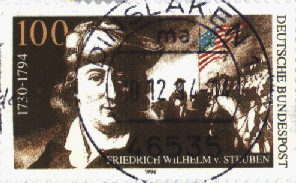A Biography of Alexander Hamilton (1755-1804)
Valley Forge (Winter 1777-78)
Perhaps nothing contributed more to the formation of Hamilton's political outlook than his experience at Valley Forge. While General Howe and his army were living large in Philadelphia, Washington's forces wintered at the desolate but easily defendable encampment. Appeals sent by Washington to congress for supplies for the 9000 or so hungry and thinly clothed troops yielded little more than suggestions that they scavenge the countryside for what they needed.
While he helplessly watched soldiers starve, and while the miseries of Valley
Forge increased by talk of a conspiracy against Washington by Gates--a
conspiracy which was eventually rooted out and crushed by a solid core of
Washington supporters--Hamilton did some hard thinking about the American
political situation. He came to the conclusion that congress was too
preoccupied with state interests to function properly, and began forming his
opinions on strong central government. He wrote to Governor George Clinton of
New York:
"Men have been fonder of the emoluments and conveniences, of being
employed at home, and local attachment, falsely operating, has made them more
provident for the particular interests of the states to which they belonged,
than for the common interests of the confederacy."
As will become characteristic of all Hamilton's political considerations,
he questioned the effects of congress's inefficiency on America's
national reputation:
"How can we hope for success in our European negociations, if the nations
of Europe have no confidence in the wisdom and vigor, of the great Continental
Government?"
Headquarters was swimming with foreign mercenaries who would likely share the shameful situation at Valley Forge with their countrymen. The United States would be a laughing stock, Hamilton worried, which no other country, especially France with whom they were negotiating an alliance, would want to waste resources to help militarily or monetarily. If congress was powerless to raise and appropriate money to supply its own army, what was it good for? Not content to simply ask questions, Hamilton began formulating a plan of what needed to be done to improve the working of the central government, and thus preserve the nation.
As the terrible winter at Valley Forge drew to a close, Hamilton found himself at an uncomfortable juncture. The exhilaration of being at the center of the action was quickly dissolving into mountains of paperwork and long days of what he termed "scribbling." As the action for the 1778 campaign got underway, Hamilton pined for battle. He wanted to be in the fray, not behind a desk.
Other developments pointed to a much more successful year of war. The French had officially recognized the United States as an independent nation, and pledged military support. As Hamilton was fluent in French, probably learned from his mother very early in life, Washington entrusted him as interpreter between himself and Admiral D'Estaing as they planned the Franco-American campaign.
 Baron von Steuben also stepped into the picture. A bogus German nobleman who,
like many European mercenaries with questionable titles, joined the war in
America for some excitement and military glory. Von Steuben became drill
master at Valley Forge, and managed to inspire the weather-worn troops with
his randy wit, and to whip them into some semblance of order for the summer
campaign. Von Steuben could speak no English, but communicated to the troops
in his heavily German-accented French, which was then translated by Hamilton.
The experience bonded them, and von Steuben later became a permanent member of
Hamilton's family.
Baron von Steuben also stepped into the picture. A bogus German nobleman who,
like many European mercenaries with questionable titles, joined the war in
America for some excitement and military glory. Von Steuben became drill
master at Valley Forge, and managed to inspire the weather-worn troops with
his randy wit, and to whip them into some semblance of order for the summer
campaign. Von Steuben could speak no English, but communicated to the troops
in his heavily German-accented French, which was then translated by Hamilton.
The experience bonded them, and von Steuben later became a permanent member of
Hamilton's family.
In June of 1778, Washington's strategy of harassment strikes on the British eventually brought both armies into battle at Monmouth courthouse. Hamilton rode with Washington into battle, and was present when the furious General gave the indecisive General Charles Lee his famous dressing-down. Monmouth was a much needed victory for Washington, and raised the morale of his troops who were still reeling from their experience at Valley Forge.
